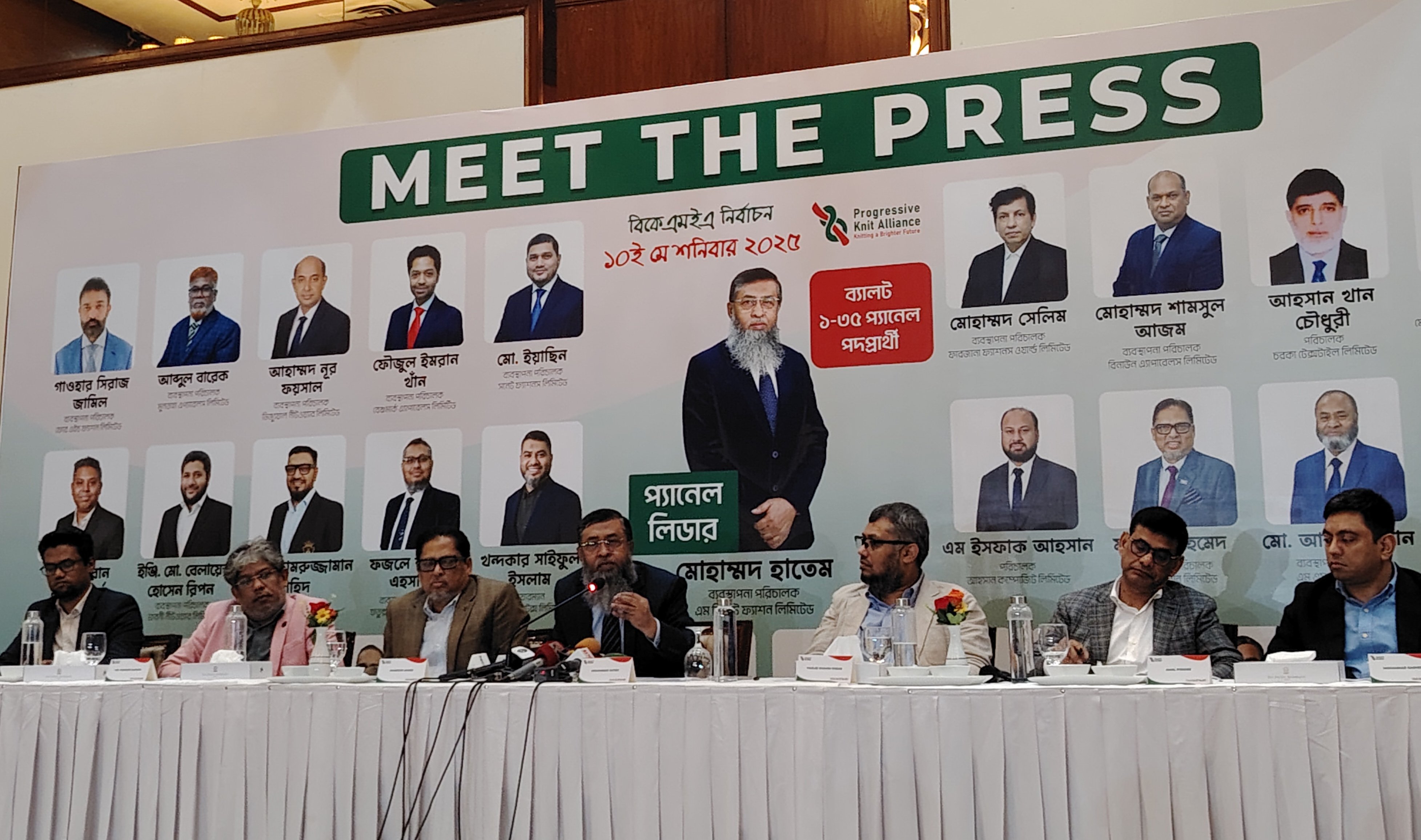News Flash
News Flash

DHAKA, May 7, 2025 (BSS) - Progressive Knit Alliance (PKA), the sole panel contesting the upcoming BKMEA election on May 10, announced a 15-point manifesto today, pledging to prioritise reforms in customs, bond facilities, and raw material imports to boost sectoral efficiency.
Addressing a gathering at a city hotel today, PKA panel leader Mohammad Hatem, also the current President of the Bangladesh Knitwear Manufacturers and Exporters Association (BKMEA), outlined key commitments, including tackling the ongoing energy crisis, diversifying export markets, and resolving the recent restrictions on yarn imports through land ports.
A total of 38 candidates are vying the polls for 2025–27, with 35 from PKA and three running independently.
Mohammad Hatem also expressed his optimism about reform initiatives stating that the Chairman of the National Board of Revenue (NBR) has shown a positive attitude towards easing regulatory obstacles.
“He (NBR Chairman) is willing to listen to the problems of businesses. We are hopeful that changes will follow,” Hatem said.
Hatem said exporters, particularly in the knitwear sector, are now facing significant challenges due to the advance income tax (AIT) system, which lacks proper adjustment mechanisms.
“Although the official corporate tax rate for our sector is 12 percent, in reality, the burden is much higher due to various complications,” he added.
Hatem, who is contesting the upcoming BKMEA election as the presidential candidate from the Progressive Knit Alliance (PKA), also pledged his continued support for the legitimate demands of workers.
“We stand beside the workers and will continue to support their rational demands,” he said.
However, he dismissed allegations of over-invoicing in imports, asserting that all declarations had been made transparent.
Hatem emphasized the need for a competitive election environment, stating that his panel had preferred a contested race over a mutual consensus.
The BKMEA election for the 2025–27 term is scheduled to be held on Saturday. A total of 582 voters are eligible to cast their ballots, including 272 from Dhaka, 224 from Narayanganj, and 76 from Chattogram.
Unveiling a 15-point manifesto, Hatem and the Progressive Knit Alliance laid out a reform-focused roadmap aimed at improving the country’s knitwear business climate.
The important among their pledges were working closely with the NBR to simplify tax laws, eliminate customs bottlenecks, and introduce transparent, accountable policies that encourage investment.
The manifesto calls for the simplification of HS codes, streamlining import-export procedures—including FOC (free-of-cost) shipments—and resolving complications in the bonded and non-bonded supply chains. The panel also pledged to push for licensing support to help non-bonded factories begin exports.
Addressing VAT issues, the alliance criticized the alleged harassment of export-oriented businesses despite statutory exemptions, and called for eliminating such barriers that hinder transportation and raise costs.
In response to current liquidity challenges, the manifesto also promised coordinated discussions with Bangladesh Bank and the relevant ministries to fix structural flaws in the banking sector, which exporters say is limiting trade.
The panel committed to restoring yarn imports via land ports to reduce lead times, ensuring uninterrupted gas supply to industries, and promoting high-value apparel production to strengthen Bangladesh’s position in global markets.
In a bid to reduce dependency on traditional markets in Europe and North America, the alliance intends to pursue trade opportunities in non-traditional markets and through international e-commerce platforms.
They also proposed stricter measures—including blacklisting—against unethical buyers who cancel orders or delay payments after goods are shipped.
Additional pledges include support for SME access to finance, contributions to policy formulation on labor and sustainability, and the construction of a permanent BKMEA office in Dhaka.
“The knitwear sector has been largely free from labor unrest thanks to proactive leadership,” Hatem said, reaffirming the association’s commitment to a collaborative approach involving workers, owners, and the government.
“We are determined to take Bangladesh’s knitwear sector to new global heights,” he said.